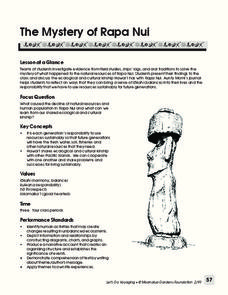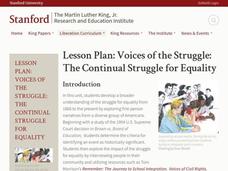Science Friday
Microorganisms on the Move
You can't b. cereus until you see this lesson! Young microbiologists learn to prepare deep well slides, observe two types of microorganisms, and compare and contrast their physical characteristics in this interactive and lively activity.
Space Awareness
Meet Our Neighbors: Sun
The sun isn't just a ball of yellow! Young scientists learn about the features of the sun using a hands-on modeling activity. They build models of the sun using common household items to represent sunspots, solar prominence, and the...
California Academy of Science
The Heat is On: Cause and Effect and Climate
The higher the number of letters in the final word for the National Spelling Bee, the higher the number of people killed by venomous spiders. Obviously, those two facts correlate, but no causation exists. Scholars view data based on...
Scholastic
Lesson Three: The Earth, Movement in Space
If you feel like you're standing still, you're wrong! The Earth is constantly rotating and orbiting under our feet. Demonstrate the Earth's movement within the solar system with a collaborative activity. With a candle or lamp in the...
Mascil Project
Circular Pave-Stones Backyard
Pack the lesson into your plans. Young mathematicians learn about packing and optimization with the context of circular paving stones. They use coins to model the paving stones, and then apply knowledge of circles and polygons to...
Kenan Fellows
Microorganisms in Pond Water
That is living in the water? Groups of two to three view pond water with microscopes in order to find microorganisms. They draw pictures of the ones they find in their slides. The groups compare their drawings to pictures of common pond...
Tracy Pendry
Cardiovascular/Circulatory System
Explore the circulatory system with a cardiovascular pump activity that promotes discovery and discussion as class members create a functioning model of the heart. Continue the learning process through a web quest showcasing the body's...
Curated OER
Muscular and Skeletal Systems
How do muscles move bones? Find out using a built-in-class model. Pupils construct a hand model with paper and string, then follow a series of directions to explore the movement process. Discover additional information about the muscular...
Curated OER
What Is Technology, and How Does It Benefit Us?
Students examine and define what technology is as well as the differences between science and technology. They assess the role of science and technology in society, conveniences technology offers and create a chart to compare the...
PBS
Stories of Painkiller Addiction: Contemplating Nature vs. Nurture
Does having an addict in your family make it more likely to become one yourself? Explore the genetic risk factors, as well as the prominent environmental influences, for substance addiction in a lesson that encourages awareness and open...
Museum of Tolerance
Disenfranchised People of the New Nation
Why are some immigrant groups in the United States embraced while others become disenfranchised? To answer this question, teams investigate why groups emigrated to the US, why some of these these peoples were disenfranchised, and their...
Curated OER
The Chesapeake Bay in Captain John Smith's Time
When Captain John Smith visited the Chesapeake Bay in the summer of 1608, what types of animals and habitats did he encounter? Your young historians will analyze primary source documents to answer this question, as well as compare the...
Tech Museum of Innovation
Seed Dispersal
Engineering challenges are not just man-made ... nature has its own set of them. A hands-on STEM activity has groups designing a seed dispersal system. Each group can only use one sheet of paper — a tough task!
EngageNY
TASC Transition Curriculum: Workshop 15
What do a cheetah, Audi commercial, and air have in common? They're all topics of an engaging inquiry-based, hands-on workshop for educators about background knowledge, reading strategies, the CER model, and argumentative writing. The...
Moanalua Gardens Foundation
The Mystery of Rapa Nui
What caused the collapse of the environment on Rapa Nui (Easter Island)? Who constructed the Moai? What was their purpose? Class members assume the role of investigators and use evidence drawn from field studies, ships' logs, and...
Teach Engineering
The Keepers of the Gate Challenge
Help your class make a connection between salt water and nanoscience. In the introductory lesson of a seven-part unit, the class explores why salt water helps a sore throat feel better. Pupils conduct preliminary research about the...
Stanford University
Voices of the Struggle: The Continual Struggle for Equality
As part of a study of the Civil Rights Movement from 1868 to the present, class members examine first person narratives, the Supreme Court case Brown v. Board of Education, and other significant events in civil rights history. They then...
Missouri Department of Elementary
My Feelings
Encourage self-awareness with a lesson that challenges scholars to identify feelings—happy, sad, mad, and scared. Using a feelings thermometer, similar to that of a bar graph, pupils discuss how they would feel in specific scenarios then...
Kenan Fellows
Determining Stream Health by the Diversity and Types of Benthic Organisms
How diverse are the benthic organisms found in local streams? Using the information learned in previous lessons on identification of macroinvertebrates and on calculating stream index values, groups determine the health of local streams....




















